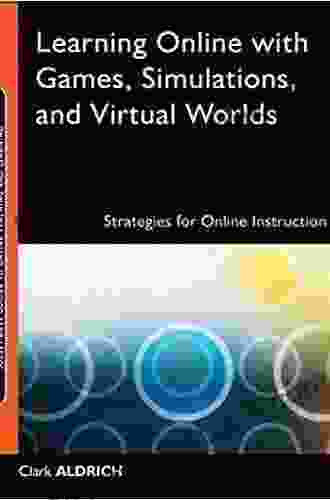Learning Online With Games, Simulations, And Virtual Worlds: A Comprehensive Guide

Online learning has become increasingly popular in recent years, and for good reason. It offers flexibility, affordability, and accessibility that traditional face-to-face learning cannot match.
However, online learning can also be challenging. Students may feel isolated and disconnected from their classmates and instructors. They may also struggle to stay motivated and engaged with the material.
4.1 out of 5
| Language | : | English |
| File size | : | 1631 KB |
| Text-to-Speech | : | Enabled |
| Screen Reader | : | Supported |
| Enhanced typesetting | : | Enabled |
| Word Wise | : | Enabled |
| Print length | : | 145 pages |
| Lending | : | Enabled |
One way to overcome these challenges is to use games, simulations, and virtual worlds in online learning. These tools can make learning more engaging, interactive, and collaborative.
In this article, we will explore the benefits of using games, simulations, and virtual worlds for online learning. We will also provide practical tips and examples for educators and learners alike.
Benefits of Using Games, Simulations, and Virtual Worlds for Online Learning
There are many benefits to using games, simulations, and virtual worlds for online learning. These benefits include:
- Increased engagement: Games, simulations, and virtual worlds can make learning more engaging and fun. This can help students to stay motivated and focused on the material.
- Improved retention: Students are more likely to remember information that they have learned through games, simulations, and virtual worlds. This is because these tools provide an immersive and interactive learning experience.
- Increased collaboration: Games, simulations, and virtual worlds can be used to promote collaboration among students. This can help students to develop teamwork and communication skills.
- Increased motivation: Games, simulations, and virtual worlds can help to motivate students to learn. This is because these tools provide a sense of accomplishment and reward.
- Improved accessibility: Games, simulations, and virtual worlds can be used to make learning more accessible to students with disabilities. This is because these tools can be adapted to meet the individual needs of students.
Tips for Using Games, Simulations, and Virtual Worlds for Online Learning
If you are interested in using games, simulations, and virtual worlds for online learning, there are a few things you should keep in mind. These tips will help you to ensure that your students have a positive and productive learning experience.
- Choose the right games, simulations, and virtual worlds: Not all games, simulations, and virtual worlds are created equal. When selecting these tools, it is important to consider the learning objectives of your course, the needs of your students, and the technical requirements of your online learning platform.
- Prepare students for using games, simulations, and virtual worlds: Before using games, simulations, and virtual worlds in your online course, it is important to prepare students for using these tools. This means providing them with instructions on how to access and use these tools, as well as explaining how these tools will be used in the course.
- Facilitate student engagement: Once students have access to games, simulations, and virtual worlds, it is important to facilitate their engagement with these tools. This means encouraging students to participate in discussions, complete assignments, and collaborate with their classmates.
- Monitor student progress: It is important to monitor student progress when using games, simulations, and virtual worlds in online learning. This will help you to identify students who are struggling and provide them with the necessary support.
- Evaluate the effectiveness of games, simulations, and virtual worlds: After using games, simulations, and virtual worlds in your online course, it is important to evaluate their effectiveness. This will help you to determine whether these tools are meeting the learning objectives of your course and the needs of your students.
Examples of Games, Simulations, and Virtual Worlds for Online Learning
There are many different games, simulations, and virtual worlds that can be used for online learning. Here are a few examples:
- Games: Games can be used to teach a variety of subjects, from math and science to history and language arts. Some popular games for online learning include Minecraft, SimCity, and Civilization.
- Simulations: Simulations can be used to create realistic learning experiences. This can be especially helpful for teaching complex concepts or procedures. Some popular simulations for online learning include flight simulators, medical simulations, and business simulations.
- Virtual worlds: Virtual worlds can be used to create immersive learning experiences. This can be especially helpful for teaching subjects that require students to interact with their environment. Some popular virtual worlds for online learning include Second Life, OpenSim, and World of Warcraft.
Games, simulations, and virtual worlds can be powerful tools for online learning. These tools can make learning more engaging, interactive, and collaborative. They can also help to improve retention and motivation. If you are interested in using these tools in your online course, I encourage you to do your research and choose the right games, simulations, and virtual worlds for your students.
4.1 out of 5
| Language | : | English |
| File size | : | 1631 KB |
| Text-to-Speech | : | Enabled |
| Screen Reader | : | Supported |
| Enhanced typesetting | : | Enabled |
| Word Wise | : | Enabled |
| Print length | : | 145 pages |
| Lending | : | Enabled |
Do you want to contribute by writing guest posts on this blog?
Please contact us and send us a resume of previous articles that you have written.
 Top Book
Top Book Novel
Novel Fiction
Fiction Nonfiction
Nonfiction Literature
Literature Paperback
Paperback Hardcover
Hardcover E-book
E-book Audiobook
Audiobook Bestseller
Bestseller Classic
Classic Mystery
Mystery Thriller
Thriller Romance
Romance Fantasy
Fantasy Science Fiction
Science Fiction Biography
Biography Memoir
Memoir Autobiography
Autobiography Poetry
Poetry Drama
Drama Historical Fiction
Historical Fiction Self-help
Self-help Young Adult
Young Adult Childrens Books
Childrens Books Graphic Novel
Graphic Novel Anthology
Anthology Series
Series Encyclopedia
Encyclopedia Reference
Reference Guidebook
Guidebook Textbook
Textbook Workbook
Workbook Journal
Journal Diary
Diary Manuscript
Manuscript Folio
Folio Pulp Fiction
Pulp Fiction Short Stories
Short Stories Fairy Tales
Fairy Tales Fables
Fables Mythology
Mythology Philosophy
Philosophy Religion
Religion Spirituality
Spirituality Essays
Essays Critique
Critique Commentary
Commentary Glossary
Glossary Bibliography
Bibliography Index
Index Table of Contents
Table of Contents Preface
Preface Introduction
Introduction Foreword
Foreword Afterword
Afterword Appendices
Appendices Annotations
Annotations Footnotes
Footnotes Epilogue
Epilogue Prologue
Prologue Stephanie L Mcandrews
Stephanie L Mcandrews Tony Roberts
Tony Roberts Michel Nadeau
Michel Nadeau Katie Rodante
Katie Rodante Ken Hyland
Ken Hyland David Mccullough Jr
David Mccullough Jr Hirokazu Kore Eda
Hirokazu Kore Eda Anabel Bright
Anabel Bright Viki Winterton
Viki Winterton Keith Dinnie
Keith Dinnie Kolby Moore
Kolby Moore Tc Littles
Tc Littles Andrea Camilleri
Andrea Camilleri Ananish Chaudhuri
Ananish Chaudhuri Marie Jones
Marie Jones Marianne Taylor
Marianne Taylor Eric Berger
Eric Berger Taylor R Cruse
Taylor R Cruse Charles M Blow
Charles M Blow Brandy Fortune
Brandy Fortune
Light bulbAdvertise smarter! Our strategic ad space ensures maximum exposure. Reserve your spot today!

 Easton PowellCrochet Super Size Pineapple Shawl Pattern: A Majestic Statement Piece by...
Easton PowellCrochet Super Size Pineapple Shawl Pattern: A Majestic Statement Piece by... Christian CarterFollow ·12.4k
Christian CarterFollow ·12.4k Edgar CoxFollow ·5.5k
Edgar CoxFollow ·5.5k Rubén DaríoFollow ·18.2k
Rubén DaríoFollow ·18.2k Ross NelsonFollow ·6.3k
Ross NelsonFollow ·6.3k Carlos DrummondFollow ·9.1k
Carlos DrummondFollow ·9.1k Samuel BeckettFollow ·6.8k
Samuel BeckettFollow ·6.8k Jake CarterFollow ·8.7k
Jake CarterFollow ·8.7k Milton BellFollow ·12.8k
Milton BellFollow ·12.8k

 Patrick Hayes
Patrick HayesDeath on Stage: Euphemia Martins Mystery 16
Synopsis In the...

 Benji Powell
Benji Powell1001 Best Baking Recipes Of All Time
Baking is a fun and...

 Terry Bell
Terry BellDestined War of the Covens: A Supernatural Saga of Power,...
Welcome to the...

 Mark Twain
Mark TwainBitcoin For Mere Mortals: A Comprehensive Guide for...
Bitcoin is a...

 Dennis Hayes
Dennis HayesThe Best Budget Gaming PC 2024: Build the Ultimate Gaming...
Are you looking to build the best budget...
4.1 out of 5
| Language | : | English |
| File size | : | 1631 KB |
| Text-to-Speech | : | Enabled |
| Screen Reader | : | Supported |
| Enhanced typesetting | : | Enabled |
| Word Wise | : | Enabled |
| Print length | : | 145 pages |
| Lending | : | Enabled |












